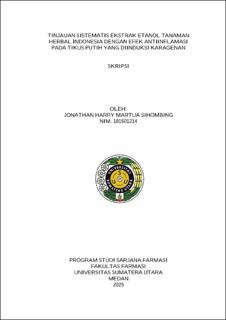| dc.description.abstract | Background: Inflammation is the immune system's response to harmful stimuli such as pathogens, cell damage, toxic components or irradiation by eliminating the cause of the stimulus and initiating the healing process. During the inflammatory response, cellular and molecular interactions occur that will minimize infection so that tissue homeostasis occurs in acute inflammation
Objective: To determine the ethanol extract of Indonesian herbal plants that have anti-inflammatory effects on rats with carrageenan inducers based on dose variations, effectiveness and efficiency.
Method: This study is a qualitative systematic review using the Preferred Reporting Items for Systematic Reviews and Meta-analyses (PRISMA) method, based on the stages of formulating research questions, determining databases and keywords, selecting articles that meet inclusion criteria, extracting data, synthesizing results that can inhibit inflammation in the soles of the feet of white rats induced by carrageenan
Results: Based on a review of 28 experimental studies, ethanol extracts from various plants have been shown to have anti-inflammatory activity in white mice, with varying effectiveness depending on the type and dose. Papaya leaf extract (Carica papaya L.) showed the highest inhibition percentage at a dose of 67.5 mg/KgBW, while bandotan leaves (Ageratum conyzoides) at a dose of 100 mg/KgBW. Among all, ethanol extract of coriander leaves (Coriandrum sativum L.) is considered the most potential to be developed as a natural anti-inflammatory therapy because it has a high inhibition percentage, short harvest time, and large extract yield.
Conclusion: Ethanol extract of coriander leaves (Coriandrum sativum L.) is the most effective and efficient extract. | en_US |


